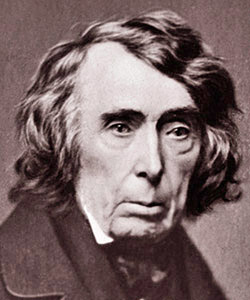
1. Roger Brooke Taney (Class of 1795)
Roger Brooke Taney was one of the nation’s most influential and controversial jurists. He was born March 17, 1777 in Maryland's Calvert County and grew up in a Roman Catholic family of prosperous tobacco farmers. When he entered Dickinson at fifteen, he fell under the influence of the college’s first president, Charles Nisbet, and became a leading member of the Belles Lettres Society and graduated as valedictorian of the twenty-four students in his class. He studied law in Annapolis and in 1807 married a sister of Francis Scott Key. Rising to prominence with Andrew Jackson, the new president appointed him in 1831 to the first of what would be several positions in his cabinet. Taney became Chief Justice of the United States in 1835 following the death of John Marshall and then served in that post until his own death in 1864. He was the first Catholic ever confirmed to that bench. During nearly three decades on the Supreme Court, Taney wrote numerous landmark opinions, including the infamous Dred Scott decision (1857) and the highly contested rebuke of President Lincoln in Ex Parte Merryman (1861). Despite his position, Taney died in near poverty in October 1864.
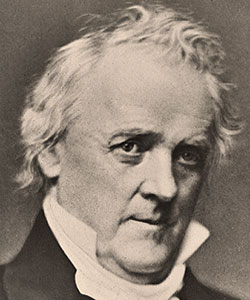
2. James Buchanan (Class of 1809)
James Buchanan was the only American president born in Pennsylvania. From Mercersburg, he graduated from Dickinson College at eighteen despite having faced expulsion the year before for bad behavior in town. An active Union Philosophical Society member, he never forgave the college for denying him the position of valedictorian for which the society had nominated him and which he felt he had earned. He soon became a successful attorney and politician in Lancaster. Buchanan was engaged to a young woman who died unexpectedly and then never married. His long career in public service began in 1814 when he was elected to the Pennsylvania house as a Federalist. For the next forty years, as a Democrat, he served in Congress, the Senate, and as Secretary of State. He was also one of the new nation’s most accomplished diplomats before becoming president in 1857. He served one troubled term filled with controversy and numerous domestic difficulties before retiring to Wheatland in 1861 to write his memoirs --the first president to publish an account of his administration after serving in office. Buchanan died in 1868.
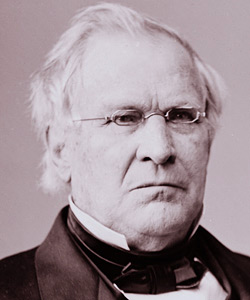
3. Robert Grier (Class of 1812)
Robert Cooper Grier was born in Cumberland County, Pennsylvania, the son of a Presbyterian minister (and member of Dickinson Class of 1788). The younger Grier spent only a year at Dickinson before graduating in 1812. He developed a law practice in Danville, Pennsylvania and eventually became President Judge of the District Court of Allegheny County. Grier was a loyal Democrat. During the mid-1840s, after the struggles of two successive Democratic presidents (John Tyler and James Polk) to fill a vacancy on the Supreme Court(future president James Buchanan turned it down), Polk succeeded in appointing Grier who was confirmed unanimously on August 5, 1846. Grier’s years on the federal bench were tumultuous. He presided over the Christiana Treason Trial in 1851 and joined Chief Justice and fellow Dickinsonian Roger Taney in ruling against Dred Scott in the controversial Dred Scott v. Sandford (1857) case. Though an ally of Taney’s, he supported the Union during the Civil War and ruled for the Lincoln Administration in the critical Prize Cases (1863). Grier’s vote in the Prize Cases was arguably the deciding factor in this pivotal case concerning the constitutionality of the Union naval blockade. He retired from the Court the same year that he died –in 1870 at the age of 76.
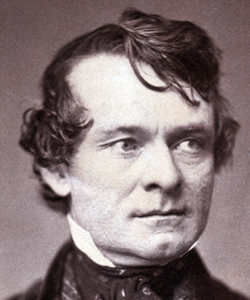
4. Andrew Curtin (Class of 1837)
Andrew Gregg Curtin was born in Bellefonte, Pennsylvania and was the son of an iron manufacturer in Centre County. After graduating from Dickinson’s Law Department under Judge John Reed, Curtin built a practice in his hometown and became a leader of the Whig party in Pennsylvania. In 1855, he was appointed Secretary of the Commonwealth. He was the successful Republican candidate for governor of Pennsylvania in 1860 and became known as one of the Lincoln’s most loyal and effective “war governors.” Curtin hosted the pivotal Altoona Conference in 1862 –a gathering of northern governors brought together to discuss the future of the war and the merits of an emancipation policy. His effectiveness and also his policies of caring for the troops sent to the Army from Pennsylvania ensured that he was over-whelmingly re-elected in 1863. After the war, he served as President Grant’s U.S. Minister to Russia. Over time, Curtin switched parties and later served in Congress as a Democrat in the 1880s. He died in 1894 at the age of 77.
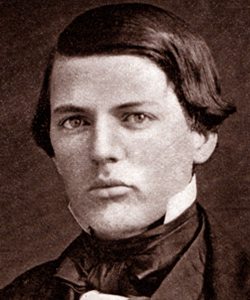
5. Spencer Fullerton Baird (Class of 1840)
Spencer Fullerton Baird was a Pennsylvania native who graduated from Dickinson and soon returned to teach natural history and chemistry at the college during the 1840s. An innovative teacher, he instituted at Dickinson some of the first class field trips into the countryside seen in the United States. When he left the college to join the Smithsonian Institution as Assistant Secretary in 1850, two entire freight cars were reportedly required to transport his collection of birds, lizards, fish, skins, and skeletons, weighing 89,000 pounds, from Carlisle to Washington. Baird became head of the Smithsonian in 1878. He also became the first U.S. Commissioner of Fisheries in 1871 and supervised the founding of Woods Hole Marine Biology Laboratory in Massachusetts. He was a noted author and widely regarded as one of the most influential naturalists in the United States during the nineteenth century. A bibliography of his works from 1843 to 1882 contains nearly 1,200 titles, including The Birds of North America, Mammals of North America, and A History of North American Birds. His career was not without controversies, but he was major public figure until his death at Woods Hole in 1887.
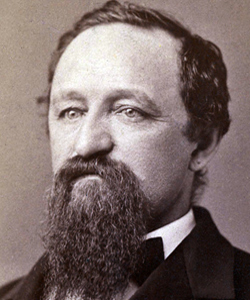
6. Charles Albright (Class of 1852)
Charles Albright was born in Berks County, Pennsylvania. A devout Methodist, Albright enrolled at Dickinson in September 1848. He was a particularly active student and represented the Union Philosophical before the college’s board of trustees on matters of reform. After leaving the college to study law, Albright joined the Western Pennsylvania Kansas Company and traveled to settle in the Kansas Territory in November 1854 with two hundred other anti-slavery activists, all seeking to ensure that Kansas entered the Union as a free state. Returning to Pennsylvania as an ardent Republican, he was a delegate to the Chicago Republican Convention that nominated Abraham Lincoln. During the Civil War, he served in the Union Army, seeing combat on several occasions and also being dispatched to quell feared draft riots in Philadelphia, and, later, labor unrest in the mines of eastern Pennsylvania. In 1865, he encountered Confederate cavalry officer George Baylor (Class of 1860) in battle, and reportedly "whipped him like thunder.” Naturally, Baylor's account differed. Following the war, in which he rose to the rank of Brevet-Brigadier General, he served in Congress and built a lucrative legal career in the Pennsylvania coal country. A devout Methodist and teetotaler, he died suddenly in 1880 at his home in Mauch Chunk. He was 49.
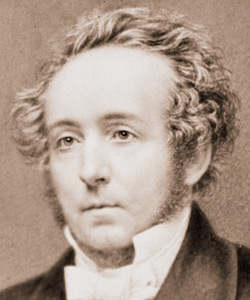
7. John McClintock (Faculty, 1836-1848)
John McCintock was born in Philadelphia. He converted to Methodism as a young man and graduated from the University of Pennsylvania in 1835. The following year, McClintock joined the faculty at Dickinson College. He taught mathematics, Greek and Latin. In June 1847, McClintock became embroiled in a violent Carlisle dispute involving three runaway slaves from Maryland. The slave catchers had been jailed briefly for kidnapping, but they convinced the sheriff to detain the slaves as well. McClintock rushed to the courthouse to tell the presiding judge that a new Pennsylvania Personal Liberty Law (passed on March 4, 1847) made it illegal to assist slave catchers. Outside the courthouse, black residents rioted, freed two of the slaves, and fatally wounded one of the slave catchers. This was apparently the first time a southerner died while chasing after runaway slaves north of the Mason-Dixon Line. In a subsequent trial, McClintock was tried but acquitted of provoking the disturbance, and the experience left him shaken. The next year, the popular professor left Dickinson’s faculty to become editor of the Methodist Quarterly Review. During the Civil War, McClintock was a leading northern intellectual and on friendly terms with Abraham Lincoln. He continued to serve the College as a trustee through most of the 1850s. McClintock died in 1870 at the age of 57.
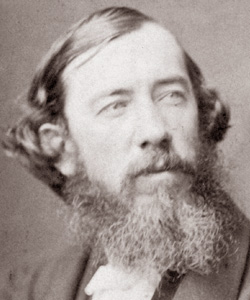
8. Moncure Conway (Class of 1849)
Moncure Daniel Conway was a unique figure in the House Divided era—a southern abolitionist. Born in Virginia, his father, Walker Peyton Conway, was a prominent slaveholding landowner, a magistrate, and a representative to the Virginia legislature. His uncle sat on the U.S. Supreme Court. Conway entered Dickinson at fifteen and had an active undergraduate life – a Union Philosophical member, he edited the first student newspaper and engineered in several legendary pranks on the hapless President Peck. One of these included the ruse that got Peck arrested as a runaway from an asylum when he arrived a railway station in Virginia. Conway began a career as a Methodist minister before experiencing a crisis of conscience that led him to the Transcendentalists in New England, the Unitarian Church and ultimately a prominent role as an anti-slavery activist. During the Civil War, after seeing his father’s slaves safely to freedom in the North, he relocated to the South Place Chapel in London, becoming over the next seventeen years one of the world’s leading pacifists and women’s rights advocates. Andrew Carnegie donated funds to Dickinson for the building of a hall in his honor in 1905. Conway remained a prolific author and leading public intellectual until his death in Paris in 1907.
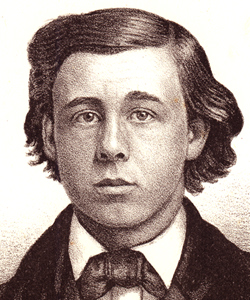
9. Thomas Nelson Conrad(Class of 1857)
Thomas Nelson Conrad was born in Fairfax Court House, Virginia. Conrad was active at Dickinson, helping to found the Phi Kappa Sigma fraternity and serving as President of the Belles Lettres Literary Society. He joined the 3rd Virginia Cavalry at the outset of the Civil War serving as a chaplain for part of the time, but eventually received a posting in the Confederate Secret Service. Known for his daring in slipping in and out of Washington DC across the Potomac, he was reportedly responsible for organizing the “Doctor’s Line” that supplied critical intelligence to the CSA, often directly to General Robert E. Lee. In his memoir, The Rebel Scout, published years after the war, he claimed that he also worked on a plot to kidnap President Lincoln, along with his old Dickinson roommate Daniel Mountjoy Cloud (Class of 1858). Conrad was imprisoned briefly after the Lincoln assassination. During the post-war years, Conrad served as a teacher and then as the third president of Virginia Agricultural and Mechanical College in Blacksburg, the forerunner of Virginia Tech, between 1881 and 1886. He died in 1905 at the age of 67.
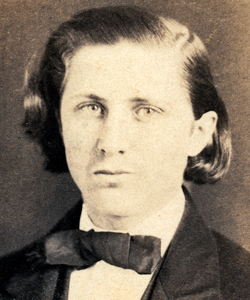
10. George Baylor (Class of 1860)
George Baylor was born in Jefferson County, Virginia, Baylor’s father led the Virginia cavalry during John Brown’s raid on Harpers Ferry in 1859 (while Baylor himself was still a student at Dickinson). On the eve of war, Baylor left Dickinson to become a teacher in Farquier County, Virginia. He joined the “Stonewall Brigade” as a private and fought at the Battle of Bull Run. In 1862, however, Baylor joined his father’s cavalry company (“Baylor’s Light Horse”), soon taking command after his father was shot and captured. Baylor himself suffered multiple wounds, but he quickly earned a reputation as one of the finest Confederate cavalry officers of the war. School legend also maintains that Baylor escaped one potentially fatal wound when a bullet struck the Union Philosophical Society badge that he always wore on his uniform. Near the end of the conflict one engagement pitted him against fellow Dickinsonian Charles Albright (Class of 1852). Albright afterward claimed that he had “whipped him like thunder.” Baylor’s account differs. Baylor lost his only two brothers during the Civil War, though he survived and became a lawyer after the conflict. He eventually rose to the position of chief legal counsel for the Baltimore and Ohio (B&O) Railroad, the line he had once raided. He died in 1902 at the age of 60.
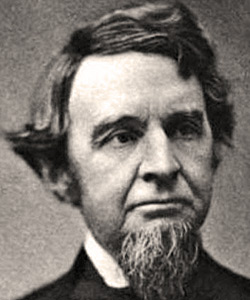
11. James Miller McKim (Class of 1828)
James Miller McKim was born on a farm near Carlisle and began his studies at Dickinson at the age of 13. He graduated in 1828 and became a “new light” Presbyterian minister. During the 1830s, swept up by the fervor of Garrisonian abolitionism, McKim helped organize the American Anti-Slavery Society and reportedly delivered Carlisle’s first anti-slavery sermon. Suddenly a figure of controversy, McKim grew defiant in his anti-slavery beliefs and left the Presbyterian Church to become a full-time abolitionist. He moved to Philadelphia in 1840 to edit the Pennsylvania Freeman, the state’s leading abolitionist newspaper. He soon became a principal coordinator of the city’s various Underground Railroad activities, helping William Still, Thomas Garrett and Harriet Tubman with their work. McKim was the recipient, for example, of a box shipped to the Philadelphia Anti-Slavery office from Richmond in 1849. The box contained a man –a fugitive slave known subsequently as Henry “Box” Brown. In 1859, he also escorted John Brown’s wife to recover her husband’s body after his execution. During the Civil War, McKim organized relief efforts for freed slaves and helped encourage the recruitment of black soldiers. After the war, he moved to New York where he helped to found the important magazine, The Nation. McKim died in 1874 at the age of 63.
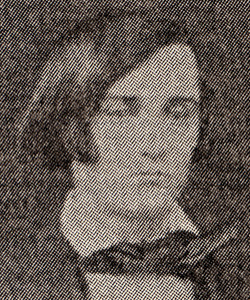
12. Littleton Washington (Class of 1845)
Littleton Quinton Washington was born in Washington D.C. Washington and his family claimed themselves as cousins of the family of George Washington. Though an active member of the Belle Lettres Society, Washington was unable to graduate from Dickinson because of financial difficulties. He became a journalist. He covered the outbreak of vigilante mob violence in San Francisco in the 1850s before returning to the District of Columbia. At the outbreak of the Civil War, he headed for Richmond, where he saw action at the Battle of Bull Run, briefly edited the Richmond Examiner, and then finally obtained a job in the Confederate State Department as a personal secretary to Robert Hunter. He was rumored to have been part of the Confederate spy network that also involved Dickinsonians such as Thomas Nelson Conrad (Class of 1857) and David Mountjoy Cloud (Class of 1858). He also kept a diary that remains a useful window into Richmond life during the war. Following the conflict, Washington covered the trial of Andersonville commandant Henry Wirz (the only Confederate executed after the war) as a journalist. He never married and died in 1902 at the age of 77.
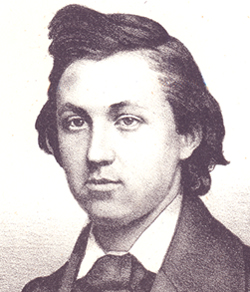
13. Horatio Collins King (Class of 1858)
Horatio Collins King was born in Portland, Maine. King was the nephew of Dickinson College’s eleventh president (Charles Collins) when he entered in 1854. Active in the Union Philosophical and a founder member of Phi Kappa Sigma, King kept a diary during his four years at college that has been preserved and partially digitized. Following his graduation in 1858, King studied law under Edwin Stanton, a noted attorney of the era and future Secretary of War in the Lincoln and Johnson administrations. King joined the Union army as a quartermaster in 1862 and rose to the rank of major. King’s bravery as a volunteer messenger in the run up to the Battle of Five Forks (April 1, 1865) and participant in an unexpected charge that repulsed the enemy at Dinwiddie Courthouse (March 31, 1865) earned him a Congressional Medal of Honor (awarded in 1897). After the war, he practiced law in New York and edited various newspapers, including the New York Star and Christian Union. King also ran for a handful of public offices as a Democrat but was defeated in each contest. He subsequently invested much of his energy into Civil War veterans’ groups and to Dickinson College, where he served as a trustee and wrote the school’s alma mater, “Noble Dickinsonia.” King died in 1918 at the age of 81.
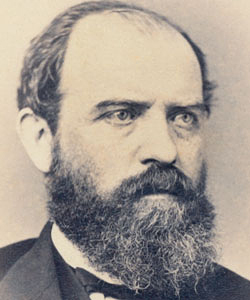
14. John Creswell (Class of 1848)
John A. J. Creswell was born in Port Deposit (then Creswell’s Ferry), Maryland, and was a leader in the Belles Lettres Society and the valedictorian of his thirty-man class at Dickinson. He became an attorney who devoted most of his attention to politics. Creswell began as a Whig, served as a delegate to the 1856 Democratic National Convention (which nominated fellow Dickinsonian James Buchanan), and then finally became a Republican who served in both the Maryland legislature and the U.S. Congress. In Congress he rose to prominence with two speeches during the Civil War; one supported the enlistment of black soldiers in the service of the Union and the other was an eloquent endorsement of the Emancipation Proclamation. After the war, Creswell served in the U.S. Senate from Maryland. His name was placed in nomination as Vice President in the Chicago convention of 1868 but he declined in favor of Benjamin Wade. He joined the Grant Administration as Postmaster General in 1869. He was also involved as the U.S. Counsel for the Alabama Claims Commission, an important nineteenth century exercise in international arbitration. Creswell also served as a trustee of the College from 1865-1871. He died of a heart ailment at his home in Elkdon, Maryland in 1891 at the age of 63.
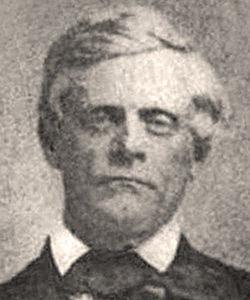
15. John Inglis (Class of 1829)
John Auchincloss Inglis was born in Baltimore, Maryland, the son of well-known Presbyterian minister James Inglis. John Inglis remained in Carlisle for a few years as a teacher after graduating from Dickinson College, before he decided to take up the practice of law and relocate to South Carolina. Inglis established a small firm in Cheraw, South Carolina with attorney Henry McIver. Their office remains standing in the town today. In December 1860, Inglis chaired the Ordinance Committee of the South Carolina secession convention in Charleston. He was thus reportedly the sole author of the South Carolina Secession Ordinance, which passed by a vote of 169-0 on December 20, 1860. Inglis never disavowed his support for secession, but he later denied that he had been the author of the ordinance. Nonetheless, when Sherman’s armies passed through South Carolina, they placed a bounty on Inglis and burned his summer home to the ground. Following the conflict, he returned to Baltimore, where he established a successful law practice and became a judge, rising to Chief Justice of the Orphans Court of Maryland. He died in 1878 at the age of 65.
Politics and Government

Charles Albright

Charles Baker

Daniel Bates

Martin Bates

James Belford

Joseph Belford

Madison Brown

David Brunner

James Buchanan

R. Carmichael

George Coffey

John Creswell

Andrew Curtin

William Daniel

Charles Denison

Harmar Denny

William Dewart

Oliver Dickey

Joseph Dysart

Powhatan Ellis

George Fisher

George Freaner

George Garrison

Charles Gere

John Gibson

Otis Gibson

Robert Grier

Charles Huston

John Inglis

John Jacob

Nathaniel Keirle

James Kelly

Jacob Kiester

William Lane

Clinton Lloyd

Charles Lore

James Marshall

Robert McClelland

Charles McClure

John McLean

M. McKinney

James McLanahan

John Nicholson

Andrew Parker

Marcus Parrott

Alexander Ramsey

John Reed

Eli Saulsbury

Willard Saulsbury

Abraham Smith

Enoch Smithers

Nathaniel Smithers

Adam Snyder

Carroll Spence

R. Stevenson

William Stewart

William Sutton

George Sweeney

Roger Taney

Philip Thomas

Otis Tiffany

Lemuel Todd

John Tucker

L. Washington

Frederick Watts

Henry Watts

Edwin Webster

William Wilkins

Thomas Williams

Hendrick Wright

Seth Yocum
































































